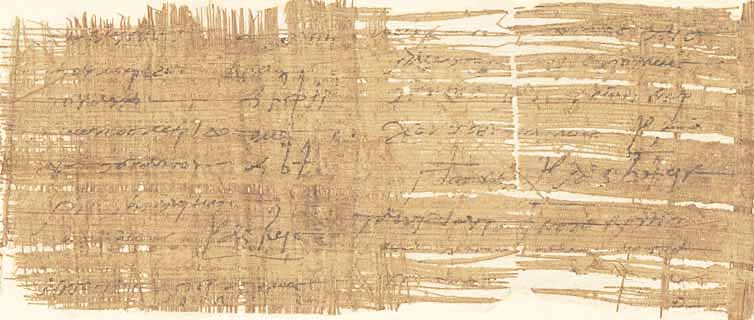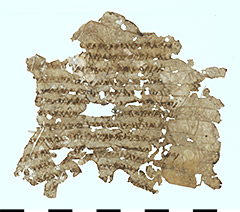P.Schubart 22 II (P. 13932)
Misoumenos – „The Man She Hated“ sounds almost like the title of a movie. However, it is the title of a work by the Greek poet Menander, a small excerpt of which has survived on this parchment from a time when there were no movies.
The parchment fragment was acquired in Luxor in Upper Egypt for the Berlin Papyrus Collection, but probably came from Hermopolis (today Ashmunein) or Panopolis (today Akhmim) in Middle Egypt. It contains writing on both sides and was part of a codex, the predecessor of today’s book. Based on the writing, it can be dated to the 4th-5th century AD. This means that this excerpt was created at least 700 years after the Misoumenos of Menanders was written.
The Greek poet Menander lived from 342/341 to 291/290 BC and, with over 100 known plays, was the most important representative of the so-called New Comedy. This stage in the development of Greek comedy was characterised less by political themes and allusions to characters as in the so-called Old Comedy. Rather, it was more devoted to the realistic portrayal of types of characters, exposing their weaknesses and showing the limits of their good intentions. Usually, there was a happy ending. So it is also the case in the Misoumenos.
In the comedy Misoumenos, the soldier Thrasonides is portrayed. He returned home from victorious battles and brought Krateia with him, who was captured and enslaved in that war. Now he falls passionately in love with her. Krateia, however, hates him because she mistakenly believes he killed her brother in battle. Although Thrasonides has Krateia in his power as her master, he does not make use of his right of possession out of sincere love, but hopes in vain for reciprocal love. His slave Getas takes on the central role of a mediator in this situation.
A small excerpt of this comedy has been preserved on the Berlin parchment. The two sides of the parchment contain remnants of a total of 26 verses that can be assigned to the third act of the Misoumenos. In the 13 fragmentary verses on the front, Getas and the maid of Krateia discuss the situation, with Getas rebuking Krateia and regretting Thrasonides. The reverse side contains 13 verses of similar content from a monologue by Getas, who has just returned from a tavern.
The Misoumenos was one of Menander’s most popular plays in antiquity and was also read and excerpted again and again in Greco-Roman Egypt. This is shown, among other things, by the fact that as many as 15 fragments of this work have survived from this region on papyrus and parchment. This makes the Misoumenos one of the best documented comedies by Menander in ancient Egypt.
But the Berlin parchment has another special feature. It can be assigned to a codex of which another fragment (PSI II 126) is kept in Florence today, which, however, does not contain any verses from the Misoumenos. Rather, it was assigned to the same codex by means of the script. The Berlin and Florentine fragments were written by the same person. The Florentine parchment now contains several verses, some of them even complete, from another of Menander’s comedies: Aspis (Shield). The codex to which these two fragments belonged thus contained excerpts from at least two different works by Menander and can thus be described as an anthology (collection). Whether this anthology also contained excerpts from other comedies by Menander or even other poets can no longer be determined, since only these two fragments are known. However, it cannot be ruled out that there is another parchment in another collection worldwide or perhaps even in the Berlin Papyrus Collection that can be assigned to this codex.
This excerpt from an Ancient Greek comedy was on display in the special exhibition „Akhmim – Egypt’s Forgotten City“.



